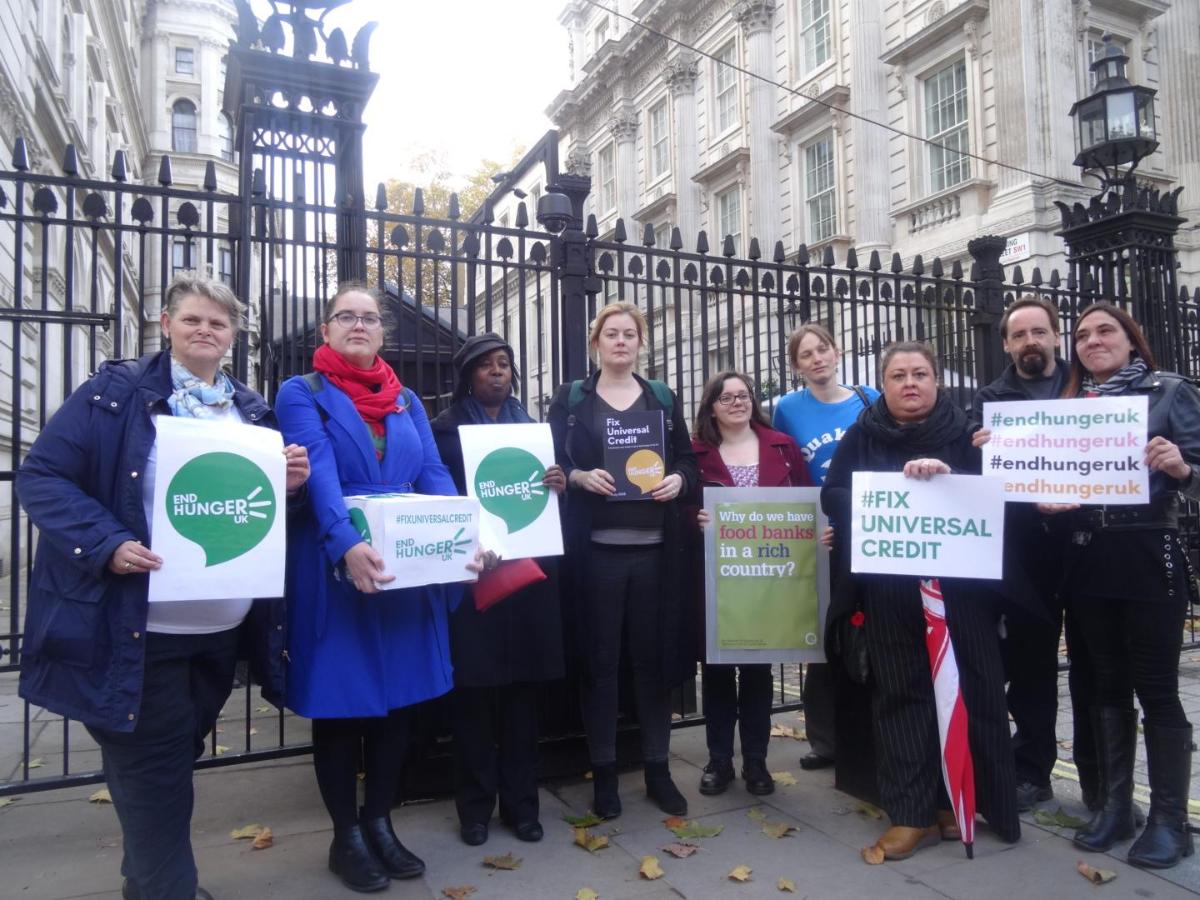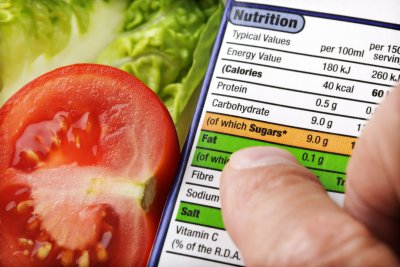

Universal Credit claimants take national petition to Downing Street, as thousands more go hungry
A national petition calling on the UK government to Fix Universal Credit was handed over at 10 Downing Street on 7 November
The petition by the End Hunger UK campaign has been circulated and signed in food banks around the country by Universal Credit claimants, people experiencing hunger, and food bank volunteers and supporters. In total, over 18,000 people have signed it.
The petition was presented at Downing Street by Tony Carson and Sue Rimington from York, who spent several weeks living in a tent this summer after moving on to Universal Credit, surviving on £4 a day between them. They were joined by managers from Trussell Trust and independent food banks and Amanda Button, who has worked with many Universal Credit claimants through her voluntary work with anti-poverty organisation ATD Fourth World.
Tony said: “Universal Credit does not work and it’s the fault of the system. It doesn’t help you get back on your feet, it traps you.”
Sue said Universal Credit was not the only cause of their problems but said: “Universal Credit has swept us further into difficulty because you never, ever, be in credit with Universal Credit.”
The petition calls for:
- Urgent action to improve the flexibility and support for people on Universal Credit, including:
- Flexibility for claimants (more scope for telephone applications)
- Focused training for all staff including work coaches and call centre staff.
- Increased awareness and implementation of Alternative Payment Arrangements
- Improvements to its design to ensure it does not leave more people at risk of debt and destitution, including:
- Debt advice included as part of Universal Support
- Reducing the waiting time for payments from five weeks to two weeks
- Introducing true yellow cards for sanctions
- Reducing the level of loan repayments from 40% to 10%
- A long-term commitment by the Government to ensure Universal Credit provides people with enough income to afford good food on a regular basis, including:
- Increasing Universal Credit levels to the real cost of living
- Restoring essential benefits including disability benefits and bring their levels up to the real cost of living.
Last week’s Budget statement suggests that the Government recognises that Universal Credit must be fixed. Some changes announced by the Chancellor are welcome, but for many living in food poverty in the UK these changes do not go far enough.
In July, nine organisations who are members of the End Hunger UK campaign, including Sustain, published a report entitled ‘Fix Universal Credit, no one should go to bed hungry’. This recommended short, medium and long term changes to Universal Credit, based on information and insight from more than 70 food banks, emergency food aid providers, and those assisting people in food poverty across the UK.
End Hunger UK welcomes the UK government’s announcement that it will reduce the maximum rate at which deductions can be made from Universal Credit from 40% to 30%. However, the report highlighted that repayments should be reduced to 10% a month and the group is also concerned that these changes will not be put in place until October 2019 meaning thousands of claimants will not feel the benefit of this change. One food aid provider said, “I saw one client who said he’d had an advance payment and had such a struggle paying it back he wasn’t ever going to risk asking for another. Advance payments don’t really solve anything in the long run.”
Sadly, the budget statement did not address the administrative and design problems inherent within Universal Credit. For example, a short-term, much-needed change would be to allow new applications to be made over the phone, as opposed to operating a solely online system, which is not accessible to those without internet access.
There has also been no recognition of the need to end the ‘benefits freeze’. Universal Credit payment levels fall far below the actual cost of a decent standard of living in the UK.
Emma Revie, chief executive of The Trussell Trust has said, “We created our benefits system to make sure support would be in place for each other, but if Universal Credit is to continue this legacy, more must be done. Foodbanks in our network have been clear: waiting weeks for a first payment, not being able to access support and receiving payments that just don’t cover the cost of essentials, are forcing people to use foodbanks. The time to act is now. We have to make sure our benefits system can help people to keep their head above water and afford food on a regular basis - no one in the UK should need a foodbank’s help.”
Sabine Goodwin, of Independent Food Aid Network, on behalf of End Hunger UK, said, “Around the country, the Universal Credit system is not working. The changes in last week’s budget were a step in the right direction, but do not go far enough and lack the urgency required. The Fix Universal Credit petition has drawn support from all over the country. We’re grateful to everyone who has signed or helped to circulate it, and call now on the Government to hear and heed what people are saying.”
Notes to editors:
- Organisations to have supported the petition include: Child Poverty Action Group; Church Action on Poverty; the Church of England; First Steps Nutrition; The Food Foundation; the Independent Food Aid Network; Nourish Scotland; Sustain: the alliance for better food and farming; and The Trussell Trust.
- The petition is due to be presented at 10 Downing Street at 2.30pm on Wednesday 7 November
- Please email or phone 0161 872 9294 with any queries in advance. On the day, please direct queries to Gavin Aitchison of the End Hunger UK campaign on 07791 626238 or gavin@church-poverty.org.uk
- Photos of the handover will be available on request on Wednesday afternoon.
- For more information on the End Hunger UK campaign, visit
The full text of the petition reads as follows
Dear Prime Minister,
We call on Government to fix Universal Credit to prevent more people going hungry.
We share a vision of a society where everyone has access to good food, and no one has to go to bed hungry.
We believe that an effective benefits system which provides financial assistance in times of crisis is essential to realising this goal.
We all rely on the welfare safety net being there for us in times of financial stress or hardship. But Universal Credit is currently failing in this task.
In areas where Universal Credit has been rolled out, foodbanks and other food aid providers report a surge in the numbers of people pushed into greater debt, destitution and hunger as a result of delays, errors, a lack of flexibility and adequate support.
As people who use food aid, food aid volunteers and staff, food aid supply workers, donors and frontline workers making referrals to foodbanks, we know first-hand that the need for change is more urgent than ever.
What we are calling for
- Urgent action to improve the flexibility and support for people applying for and in receipt of Universal Credit.
- Improvements to the design of Universal Credit, to ensure it does not leave more people at risk of debt and destitution.
- A long-term commitment to ensure that Universal Credit provides people with an adequate income, so that they can afford good food on a regular basis.
By July 2019, there should be better training for staff and increased flexibility for claimants:
- Debt advice included as part of Universal Support.
- Flexibility in applications (more scope for telephone applications).
- Increased awareness and implementation of Alternative Payment Arrangements.
- Focused training for all staff including work coaches and call centre staff.
In the medium term, ways to reduce the risk of debt and destitution should be found by:
- reducing the level of loan repayments from 40% to 10%;
- reducing the wait time for payment from 5 weeks to 2 weeks;
- introducing true yellow cards for sanctions.
And in the long term, changes should be made to:
- Restore essential benefits including disability benefits and bring their levels up to the real cost of living.
- Increase Universal Credit levels to the real cost of living.
Food Poverty: Championing people-powered projects that tackle the root causes of food poverty.
Sustain
The Green House
244-254 Cambridge Heath Road
London E2 9DA
020 3559 6777
sustain@sustainweb.org
Sustain advocates food and agriculture policies and practices that enhance the health and welfare of people and animals, improve the working and living environment, promote equity and enrich society and culture.
© Sustain 2026
Registered charity (no. 1018643)
Data privacy & cookies
Icons by Icons8







